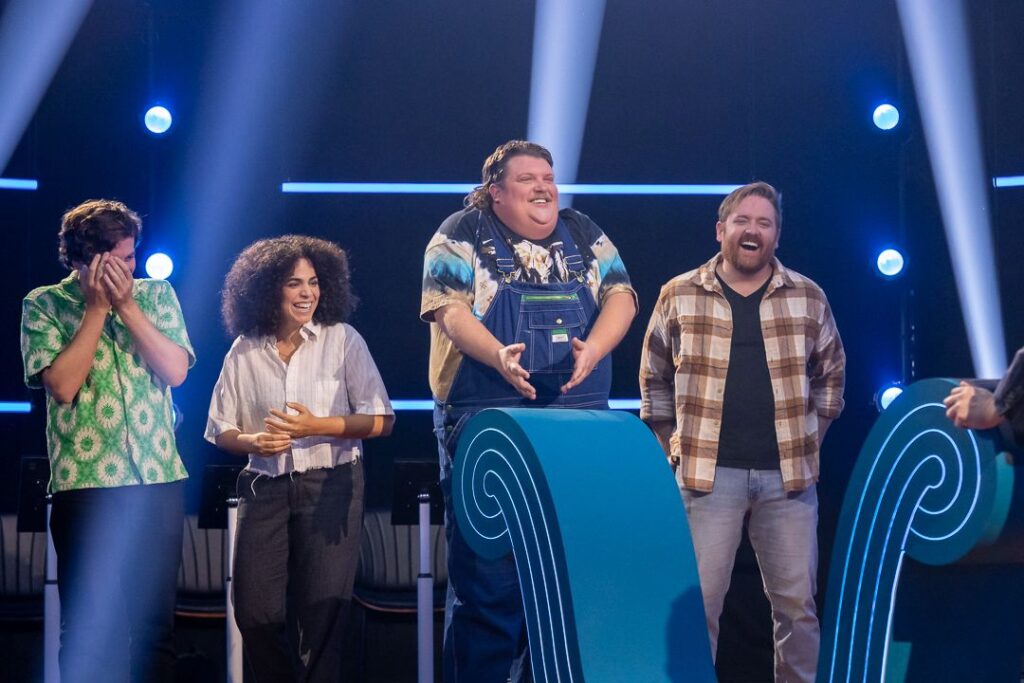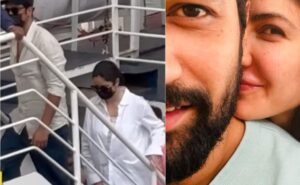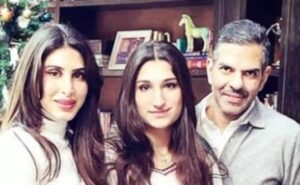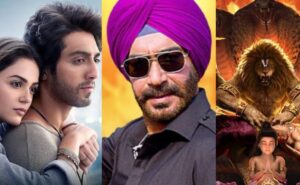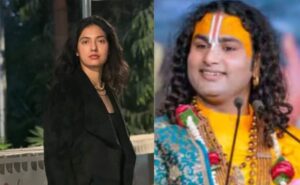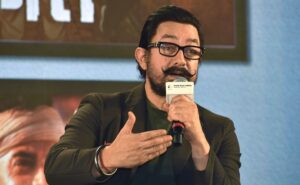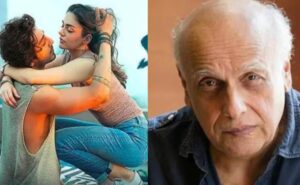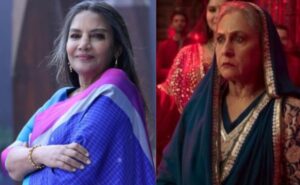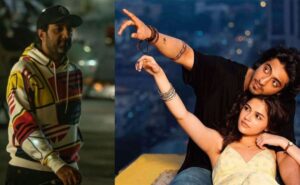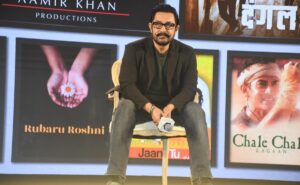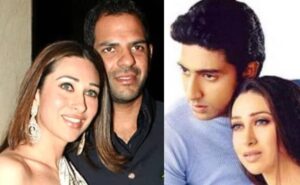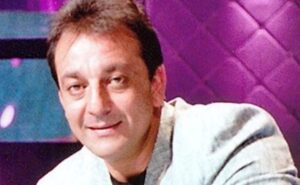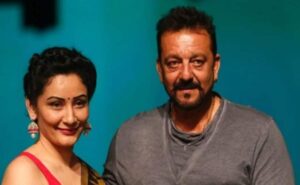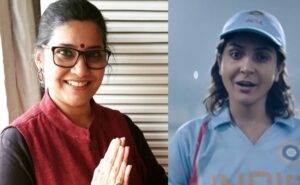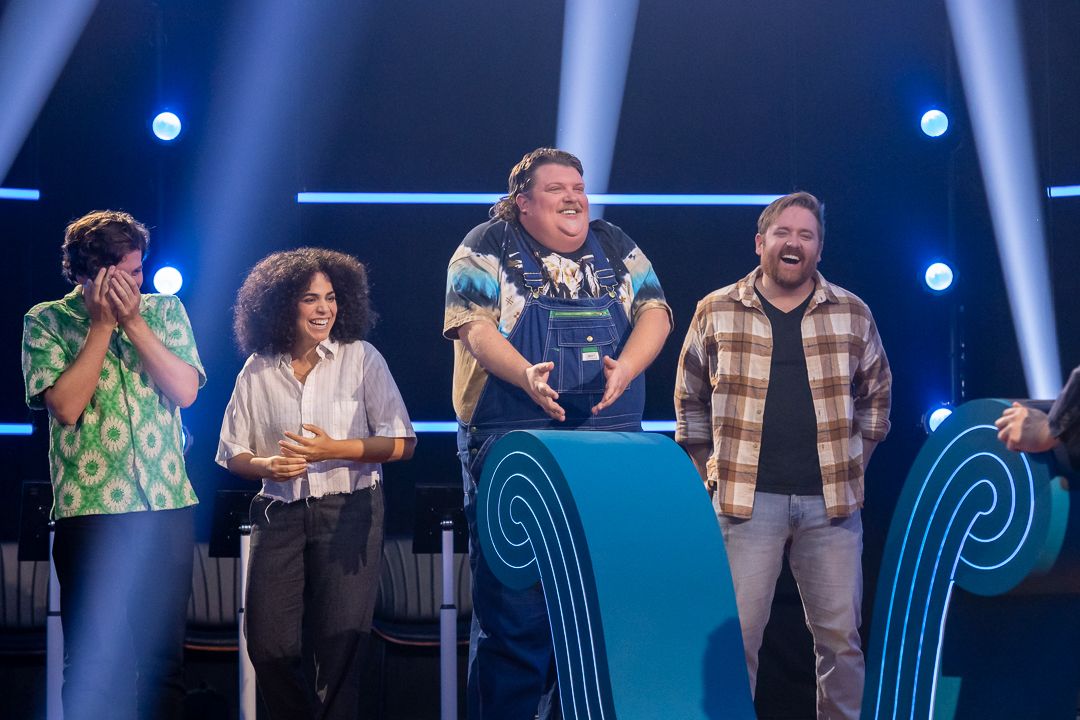
The latest episode of Game Changer, Dropout’s comedy game show where the game changes every episode, begins with comedians Jacob Wysocki, Kimia Behoornia, Kurt Maloney, and Jeremy Culhane playing a seemingly straightforward version of Who Wants to Be a Millionaire. This is not unusual: Dropout has produced its own versions of popular game shows and reality competition franchises, such as The Bachelor, Survivor, and The Circle. But what is unusual is what happens after Wysocki wins the opening challenge — drawing a “cool cat” — and steps center stage to begin answering trivia questions tailor-made to his interests and personal history. As his winnings pile up, Wysocki tells host and Dropout CEO Sam Reich, “I feel absolutely insane!”
Contestants claiming to freak out during a Game Changer challenge is familiar enough — Wysocki previously expressed this sentiment while playing a demented version of Simon Says — considering the show’s producers and crew make a game out of psyching out players as they try to figure out the rules and parameters of the game they’re playing. It’s hard to fault the comedians for having an additional level of paranoia when the show has produced episodes that conspire to set up a single person. Previous examples include “Yes or No,” in which the only rule was that Brennan Lee Mulligan couldn’t win, or “Don’t Cry,” an episode designed to celebrate Jess Ross during a personally challenging year. Before long, it becomes clear that this is one of those Game Changers.
Wysocki has indeed been set up by his colleagues and friends: The game he’s playing is designed to recognize his popularity among the Dropout audience and acknowledge the personal losses he’s recently experienced. He gets every question correct, regardless of his answer; his longtime friends and collaborators are introduced into the game, and by the episode’s emotional conclusion, he’s won a prize total of $100,000. But even as he was winning “an astonishing amount of money,” Wysocki couldn’t lose sight of the fact that “you’re also making a television show as a comedian, so you have to balance those two things.” Speaking over Zoom before he performed at the Just for Laughs comedy festival in Montreal, Wysocki broke down how he processed it all in the moment: “You’re just letting the comedy training come and see what happens.”
Can you walk me through the process of getting cast in an episode of Game Changer? I know Sam and the team go to great pains to make sure the cast members don’t get tipped off about what’s going on.
It’s hard to speak about it holistically because each episode is so specific, and I think depending on the level of secrecy or mischief, probably requires different levels of communication. The very, very beginning is, you get an email from Sam: “I would like you to be on this season of Game Changer. Here are some vague sentiments — how spicy are you willing to get?” And so you’re sort of giving soft consent on this email. Then a bunch of time goes by, you forget about it, and you show up to Dropout doing other jobs, wondering if it’s secretly going to be a Game Changer.
When did you realize this wasn’t a typical Game Changer episode but an episode designed around you?
Sam said this thing to all of us before, where he was being vague, and he was like, “Remember, it’s got to be funny and everybody gets a turn.” So when I was picked first to start answering these trivia questions that were lightly about my life, I was like, “Cool, I’ll do two or three of these, I’ll make a hundred bucks, I’ll go sit down.” I thought that was the game. We’re going to take rotating turns, answering interpersonal questions about ourselves and maybe our friendship.
I had no information other than that it was going to be me, Kurt, Kimia, and Jeremy. Kurt and I have been friends for nearly two decades. Kimia and I have known each other since we were both 18. So I thought it was like they were playing with the fact that we were a historical group of friends, and it would be answering questions about our friendship. Then when we got to 15, 20,000 bucks, I was like, This is getting kind of crazy. When are we going to have somebody else go? Then it kept going, and it got to a point where I realized, Oh, nobody else is going, and it’s just going to be me.
It was like watching Jim Carrey realize what’s going on in The Truman Show.
I think it took me longer because there were two levels of acceptance. There’s the level of acceptance that’s, Oh, this episode is just about me. I’m the driving force of the momentum and the comedy. I have to humbly accept one of the most righteous things that could ever happen to a person, which is a windfall. That’s a lot of money for how I came up and the world that I grew up in.
Besides the large amount of prize money, what element of the episode was the most meaningful to you?
Being there with my buddies. I think my friend group is one of the best things about me. To have friends that you’ve known for so long and that you’ve grown up with, I think that’s so special. The strongest bonds I have are all in one room celebrating this moment.
I watched a lot of groups get big — Broken Lizard, the State, Good Neighbor, the Whitest Kids You Know — and that was sort of maybe a blueprint for how you could get into Hollywood. They were all just buddies doing comedy, and they made their stuff, and eventually people paid them to make stuff. We came up thinking, All right, if we just keep making videos like all these other big influences, maybe we can do that too. At a certain point, life gets in the way, you grow up, and you realize, Oh, it’s really hard being a group of dudes trying to make it in this town. For whatever reason, it didn’t work out for us as a group, but it worked out for a lot of us as individuals. So it was particularly special making something together, being funny, and doing bits. For some of us, we haven’t done that together in a long time and it felt really good.
The speech you gave about what the money would mean to you was disarmingly sincere. What was going through your mind at that moment?
That was probably the hardest part of it. You have this crazy experience, and then the ringleader goes, “Land the backflip.” That’s the time when you want to be perfect because something perfect just happened to me. It was just a lot of pressure. How much do you want to share with an audience? There are things that happened in my life that are technically public, but I don’t really share as my onscreen persona. Do I talk about my active grief and that there are people missing? You have to create a separation of church and state. So, you’re threading so many different lines: Be funny, be gracious, be celebratory, be eloquent, be concise, and also self-edit so that I’m not being too personal and I’m not letting a bunch of great fans, but ultimately strangers, into the true intricacies of my life and my heart.
Sam does mention that it was a difficult year for you. Can you tell me a little bit more about that?
I was actively grieving the loss of my mother and a member of our sketch group, Roger Garcia III. And yeah — they’re there, but they’re not.
You’ve become popular online through Dropout. That helps Dropout, but it also helps you. However, you mention the need to have these boundaries, as you say, with strangers whose affection for you is intense and well-meaning, but they don’t know you, and you don’t know them. How has that been for you?
The infancy of the popularity is very novel. I don’t think the human brain and body are designed to have unearned affection, which, I think parasocial relationships can sometimes feel that way. I came up in a world where I do a live show, I hear the live audience laugh — that’s our contractual exchange. To get it after the fact is just something that you’re not used to. It’s sort of this compliment that exists in a vacuum. It’s a process that I’m still learning, and the people who are watching us are also learning.
How have you been since the filming of that episode?
Awesome. My go-to joke is it’s all gone. I spent it, I burned it. No, but I feel great. I think the craziest thing about it all is that the same evening, the Dodgers won the World Series. I’m an L.A. boy. So we finished filming and then me and my friends go get a case of beer and we drove down to Echo Park and we’re just partying in the streets and we’re celebrating our city, but we’re also celebrating what just happened. We got to go out and be like, “Yeah!” and we didn’t look crazy because everybody else was doing it. That makes it even more special and even more memorable. And the night ended with us watching a Los Angeles Metro bus explode.
I still feel pretty insane about it when I really sit down and think about how I won a huge amount of money because of the work I’ve put in and the relationships I’ve built with the people who watch the place where I work. It’s a celebration of that. And it’s also a recognition that I had a pretty shit year and had to keep working. I got to keep working for the company. There were times when stuff with my mother got really intense, and I had to be like, “I can’t work today. I’m sorry, but you’re going to have to call Jeremy Culhane. You’re going to have to bring in Jeremy.” They were extremely kind and generous throughout that process.
Related
“That’s the time when you want to be perfect, because something perfect just happened to me.”

